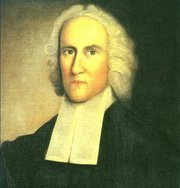JE Resolutions 1 and 2
 1. Resolved, that I will do whatsoever I think to be most to God's glory, and my own good, profit and pleasure, in the whole of my duration, without any consideration of the time, whether now, or never so many myriads of ages hence. Resolved to do whatever I think to be my duty and most for the good and advantage of mankind in general. Resolved to do this, whatever difficulties I meet with, how many soever, and how great soever.
1. Resolved, that I will do whatsoever I think to be most to God's glory, and my own good, profit and pleasure, in the whole of my duration, without any consideration of the time, whether now, or never so many myriads of ages hence. Resolved to do whatever I think to be my duty and most for the good and advantage of mankind in general. Resolved to do this, whatever difficulties I meet with, how many soever, and how great soever.JE begins at the same place the Westminster Shorter Catechism begins: with the chief end of man—to glorify God.
Q1: What is the chief end of man?
A: Mans chief end is to glorify God1, and to enjoy Him forever2.
1. Whether therefore ye eat, or drink, or whatsoever ye do, do all to the glory of God. (1Corinthians 10:31, KJV)
2. Whom have I in heaven [but thee]? and [there is] none upon earth [that] I desire beside thee. My flesh and my heart faileth: [but] God [is] the strength of my heart, and my portion for ever. (Psalms 73:25-26, KJV).
If there was ever a man who sought to glorify God and enjoy Him, it was Jonathan Edwards. It informed his every thought, every sermon, every theological and scientific work, indeed, every aspect of his life. He is known as the greatest Protestant theologian, indeed, the greatest academic mind America has ever produced.
He set his mind and heart on glorifying and enjoying God with his whole life, no matter the cost or the difficulties. He desired to impart this to others because he knew that a God entranced life is the duty of man. Read what John Piper has to say about the influence of JE on his life and ministry.
2. Resolved, to be continually endeavoring to find out some new contrivance and invention to promote the aforementioned things.
I guess that’s what we’re doing here—“finding out some new contrivance and invention” to help us engage in self examination and to assist us to meditate upon God’s glory.
In one of my earliest entries on this blog I made this comment:
"I have 'used the thoughts of other men's brains' my whole Christian life and find that it has not made me simply a follower of other men, but truly a follower of Christ."
The thoughts of JE’s remarkable brain and the legacy of his life are a rich treasure trove that promote true Christian faith and growth in grace. At the beginning of The Works of Jonathan Edwards, Volume 1 there is an essay called “The Genius and Writings of Jonathan Edwards” which concludes with this paragraph:
“We cannot conclude without observing, that they (the writings of JE) will be found to possess, beyond most others, the two-fold merit of at once conveying valuable and original thoughts, and of quickening and invigorating the intellectual powers of the reader.
That’s quite a “contrivance”, isn’t it?
[UPDATE: Kim, at The Upward Call, has posted her reflections of Resolution 1 on her blog. Good Stuff.]
[UPDATE: More good stuff at The Upward Call on Resolution 2. Don't miss it!]

0 Comments:
Post a Comment
<< Home